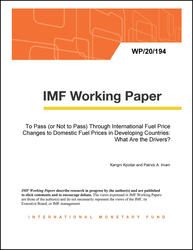
To Pass (or Not to Pass) Through International Fuel Price Changes to Domestic Fuel Prices in Developing Countries: What Are the Drivers?
To Pass (or Not to Pass) Through International Fuel Price Changes to Domestic Fuel Prices in Developing Countries: What Are the Drivers?
READ MORE...
Volume/Issue:
Volume 2020
Issue 194
Publication date: September 2020
ISBN: 9781513557625
$18.00
Add to Cart by clicking price of the language and format you'd like to purchase
Available Languages and Formats
| English |
Prices in red indicate formats that are not yet available but are forthcoming.
Topics covered in this book
This title contains information about the following subjects.
Click on a subject if you would like to see other titles with the same subjects.
Inflation , Economics- Macroeconomics , Public Finance , WP , price , pass-through , country , government , fuel price , pass-through coefficient , price gap , government price regulation , kerosene price , crude oil price dynamics , price differential , fuel pump price flexibility , fuel price increase , Fuel prices , Energy subsidies , Oil prices , Inflation , Consumption , Global , retail fuel prices , fuel subsidies , price flexibility , fuel price liberalization , input cost , fuel price change
Summary
While many developing countries limit the international fuel price pass through to domestic fuel prices, others do not. Against this backdrop, we examine the factors that determine whether governments allow international fuel price changes to be passed through to domestic prices in developing countries using a dataset spanning 109 developing countries from 2000 to 2014. The paper finds that the pass-through is higher when changes in international prices are moderate and less volatile. In addition, the flexibility of the pricing mechanism allows for higher pass-through while exchange rate depreciation and lower retail fuel prices in neighboring countries inhibit it. The econometric results also underscore the fact that countries with inflation tend to experience lower pass-through, whereas those with high public debt exhibit larger pass-through. Finally, no evidence is found that political variables or environmental policies matter with regard to fuel price dynamics in the short-term. These findings, which are consistent across fuel products (gasoline, diesel and kerosene), allow us to draw important policy lessons for fuel subsidy reforms.
Copyright © 2010 - 2026
Powered by:
AIDC



